Canada's Yellow Vest movement feeds off some of the same anti-elite and anti-urban identity sentiments as the Gilet Jaune movement in France.
By Nicholas Kevlahan
Published September 04, 2019
I spent the past year working in Grenoble, a city about the size of Hamilton (metro population: 452,000) in southeast France near the Alps. As someone interested in urban design, I was particularly looking forward to seeing how Grenoble's new Mayor, Éric Piolle, was implementing his bold plans to make Grenoble more environmentally sustainable, attractive and inclusive.
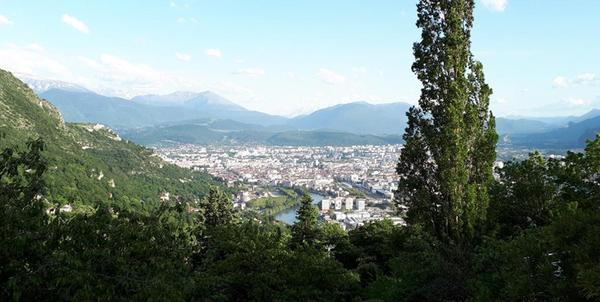
View of Grenoble
These changes have included implementing a default speed limit of 30 km/h, shifting road space from cars to pedestrians, cyclists and public transit, and an effort to "green" the city by planting more trees and improving public parks.
He is also building a network of long-distance separated bike paths between downtown and the suburbs ("Chronovélo": 44 km on four routes to be completed by 2020). On the social inclusivity front, they will increase the proportion of geared-to-income social housing from 21 percent to 25 percent of all housing stock by 2025.
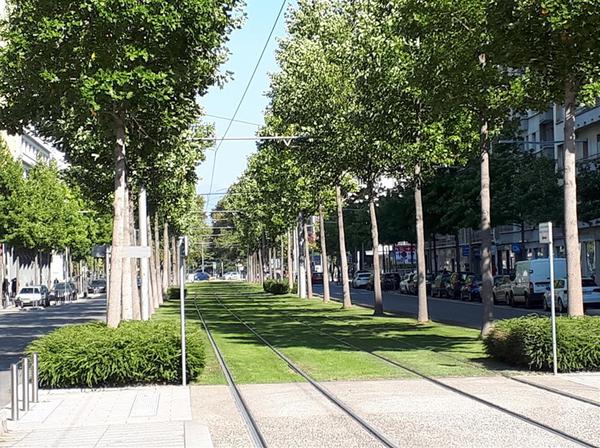
Park-like LRT lines in central Grenoble
At the same time, however, France was being shaken by the weekly Saturday afternoon demonstrations and riots of the "Gilets Jaunes" (Yellow Vests). Although the Gilets Jaunes were protesting many different issues - including rising inequality and the reforms of the new centrist President Emmanuel Macron - at its heart the movement was a protest by those living in rural and exurban areas against those living in France's cities.
They were protesting not just against the relative success and wealth of the cities, but against their values. And, in particular, the "green" environmentally sustainable values being promoted by people like Grenoble's Green Party mayor.

La Fête des Tuiles: a celebration of community and environmental groups on the Grenoble LRT lines last June
It turned out that Grenoble was unaffected by the extreme violence and disruption that hit cities like Paris, Bordeaux and Toulouse. The Gilet Jaune movement was relatively peaceful and rapidly decreased in size after the initial November and December "Actes".
But the Grenoble Gilet Jaune protests did share one common feature with these others: they were almost exclusively driven by people who came in from the surrounding regions and neighbouring departments, not by the residents of the city itself. They were coming to protest against their fellow urban-dwelling citizens, as much as against the government.
Why did the protesters feel the need to drive for an hour or more to protest in Grenoble (or in Paris or Bordeaux or Toulouse) rather than protesting in their local towns?
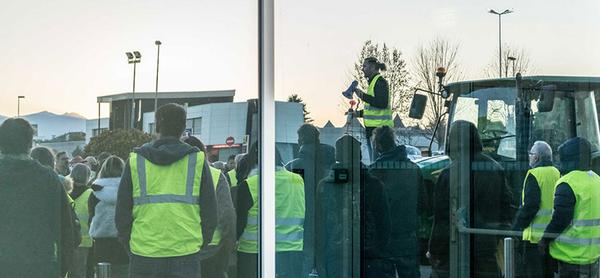
Gilets Jaunes meeting in Grenoble (Image Credit: Coline Buch)
One factor is that mid-size and larger French cities really are, in many ways, very successful attractive places to live. And in many cases they are becoming much wealthier than the surrounding rural areas.
Public transport is excellent, infrastructure is very well maintained and they are lively and liveable. Outside of Paris, they are also relatively affordable: it is cheaper to live in Grenoble than in Hamilton, even though Grenoble is a very economically successful high tech hub that attracts a lot of international residents.
Even though Paris is becoming increasingly unaffordable for buyers, it maintains some socioeconomic diversity because it is required (like all French cities) to ensure that at least 20 percent of all accommodation is geared to income.
The attractiveness and investment in cities has paid off, but it has also accentuated the contrast with rural and exurban areas which have seen steep declines in population and resulting cuts in services.
For many rural residents, the cities are another country filled with residents they perceive as "elites" who look down on them and their values. Gilet Jaune protesters often spoke of city residents watching their protests with a look of disdainful amusement. They felt that they were in foreign territory!
This protest by rural residents (not all of them poor) against the cities is an entirely new phenomenon. It is important to note that these protests were apolitical: spanning the spectrum from extreme left to extreme right with many politically unengaged citizens in the middle. Although various parties on the left and right tried to capture them, the Gilets Jaunes remained outside traditional politics.
They are protesting not so much inequality or elitism per se, as the urban/rural divide. This divide in wealth and values has developed in many countries (especially the USA), but you don't see rural Americans travelling en masse to protest in New York, Chicago or LA!
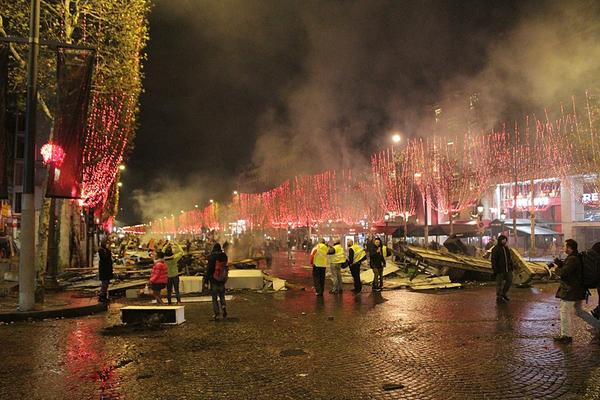
Aftermath of a Gilet Jaune riot Saturday 25 November 2018 on the Champs Élysées in Paris. (image Credit: L. Nicollet)
One little noticed feature of the Gilet Jaune movement, especially outside France, is that it is in some ways a protest movement of motorists against policies that they feel disadvantage driving.
The protests were triggered by two reforms: a small rise in the gas tax to reduce carbon emissions, and a reduction in the speed limit on rural highways from 90 km/h to 80 km/h to reduce injuries and fatalities.
Neither of these changes would seem to be that significant - in fact, the second should cancel the cost of the first - but they triggered a wave of outrage in the countryside. They were seen as the unfeeling decisions of an urban elite who didn't care that rural residents depend on their cars.
As we've seen in Hamilton's two-way conversion debate, even in cities, many motorists' self-identity is closely tied to their cars. An attack on cheap and easy driving is an attack on me!
One of the unofficial leaders of the movement, Éric Drouet, is a long-distance truck driver and car tuning enthusiast who posts numerous videos and commentaries on Facebook while driving around the country.
Outside the big cities, the signature Gilet Jaune actions were to camp out on roundabouts, damage photo radars and block autoroute toll booths or make them "free". At one point, about 75 percent of all photo radars were put out of action, which resulted in a big jump in motorist deaths ... which the Gilets Jaunes and motorist groups blamed on the speed limit reductions.
The Bulgarian sociologist Ivaylo Ditchev has even claimed that the Gilet Jaune protests are essentially a protest by motorists against the efforts of urbanites to reduce the place of cars in cities and in society as a whole.
The "war on cars" does not just make their life more difficult and expensive, it strikes at the core of their identity.
He points out that driving is a largely solitary, private activity and that a motorists' movement will therefore necessarily be individualist and lack a clear focus or political structure. It is a reactionary movement of individuals with a range of personal concerns and priorities, not a political movement in the traditional sense.
Almost all the organizing was done at a grassroots level via social media postings (primarily Facebook), rather than actual meetings or through the formation of a political party.
This is clear from the central political demand of the Gilets Jaunes, decided via Facebook polls: the Référendum d'Initiative Citoyenne (RIC). This is essentially government by referendum, with the aim of bypassing political parties and members of parliament entirely and letting the people make all decisions directly and individually.
For those interested in urban design, the most important lesson from the Gilet Jaune movement is perhaps that decisions about city structure and mobility are not just about engineering, protecting the environment or optimizing how we get around. Our feelings about where we live, how we live and how we get around are central to our sense of self and self-worth. They define us.
When the Mayor of Paris or Grenoble states that their goal is to make their city more liveable by reclaiming space that has been given over to the automobile, many people (especially rural or exurban residents) see this as a personal attack on them and their way of life.
When these urban design decisions are actually successful despite overwrought predictions of disaster every time a bike lane is installed, it actually increases tensions, since cities become ever more attractive places to live and work. Those who objected to the changes forget that the city has become wealthier and more attractive in large part because of the changes they opposed.
Here in Canada, the Yellow Vest movement is a very different beast. But it does feed off some of the same anti-elite and anti-urban feelings of the Gilets Jaunes. Somewhat shockingly, the Yellow Vest protesters at City Hall have even used vehicles as weapons, driving a school bus at counter-protesters.
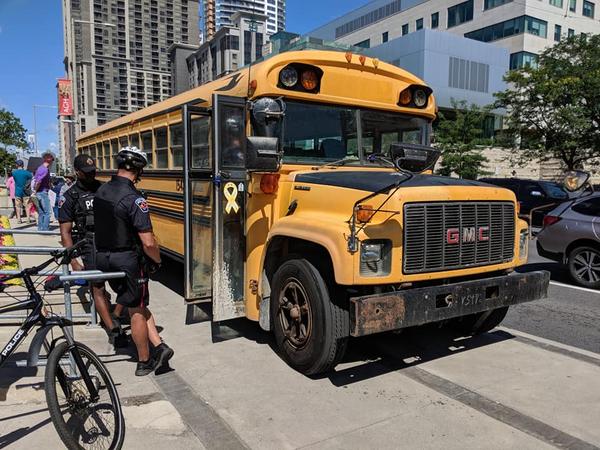
A YV protestor drove a bus onto the sidewalk during an anti-fascist demonstration at City Hall on August 10, 2019 (Image Credit: Cameron Kroetsch)
This doesn't mean we should stop making our cities more liveable, economically successful places. Canadian cities like Hamilton suffered decades of under-investment and decline before their recent tentative revival. And it doesn't mean that we should stop reclaiming urban space lost to motor vehicles for human beings.
But we should perhaps be more conscious of the fact that many people see these changes as threatening attacks on their core values and sense of self.
By nicolesmith (registered) | Posted September 04, 2019 at 10:07:50
Dear Nicholas,
This is a fascinating article on the Gilets Jaunes. Thanks for the time and trouble to put it together and publish it here.
With respect, I believe you are mistaken about the Yellow Vests here. While I am sure that they feel attacked on their core values and sense of self, their core values and sense of self appear to be largely rooted in xenophobia, racism, zero-sum thinking etc. There is little or no significant trace that I can see of true anti-elite and anti-urban sentiment per se. See for example https://www.vice.com/en_ca/article/9kxkw...
Warm regards,
Nicole
Comment edited by nicolesmith on 2019-09-04 10:08:02
By Ryan (registered) | Posted September 04, 2019 at 10:13:02 in reply to Comment 130358
I don't think this is an either/or situation. In addition to their xenophobia and paranoia, Canada's Yellow Vests are also aggressively anti-environmental, anti-cycling, anti-transit, pro-driving (think of the United We Roll convoy) and definitely anti-elite.
By ergopepsi (registered) | Posted September 04, 2019 at 15:29:44
Good article.
I wish people would see the Hamilton yellow vests as more of a symptom of a problem than an enemy to be stamped out. They are people misinformed perhaps, disenfranchised, marginalized and angry. Does anyone have the courage to dialogue or will it be more infantile shouting matches?
You must be logged in to comment.
There are no upcoming events right now.
Why not post one?